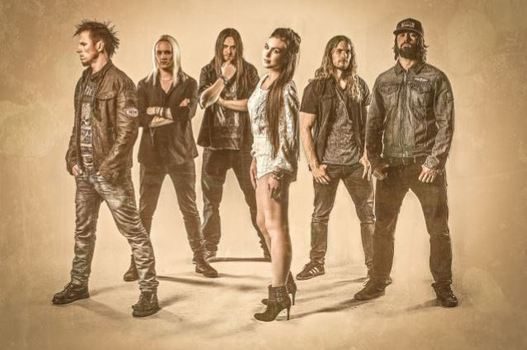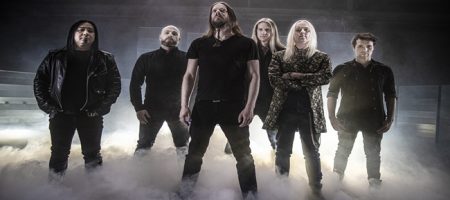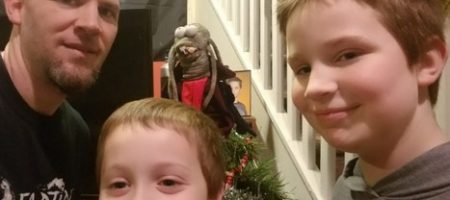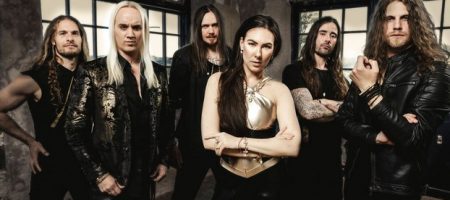Amaranthe – Limitless Potential
Wednesday, 19th October 2016
On the verge of breaking through the underground, Amaranthe has come a long way since the release of their first album back in 2011. Their hybridization of power metal, melodic death metal, pop, EDM, and more made them immediately identifiable. As did their use of three singers – clean female, clean male, and growls. But with an immediately unique sound, sometimes it makes it all the harder to further branch out. Not to mention the fine line that some fans will draw, particularly when your metallic edge is embedded with big pop hooks. Go too far in one direction and you risk losing some of that fanbase.
But with their fourth album, Amaranthe have embraced all the parts that make them unique and maximized them. Everything is bigger, better, and branches out from their past. Some songs are particularly heavy, some songs are particularly poppy/danceable. But one thing is for sure – it’s hard to ignore the sound that Amaranthe has been building upon. Maximalism has all the makings of the album that will deliver Amaranthe to an even wider audience, and done without sacrificing the band’s ideals. Connecting with vocalist Elize Ryd through Skype, we discussed the changes implemented this time around, the polarizing release of “That Song,” and her thoughts on a solo project.
Dead Rhetoric: What do you feel needed to be done to get Amaranthe to the next level with Maximalism?
Elize Ryd: The most boring way [to move forward] would be to just copy ourselves. You shouldn’t listen to critics [as a musician], but we couldn’t get past the fact that some reviewers mentioned that with our second and third albums, it was exactly what they expected from Amaranthe. The songs sound very similar and they were built in the same structure. I even kind of agree with it, because when I listen to it – it’s very similar in some ways. So I thought, “What can we do to make things a little different without changing our sound too much?” So we brainstormed and we talked about what we liked, and when it comes to the live show…it would be so cool to do something like this or that, maybe have a song that the audience can be more involved with.
We started to find different elements that we liked. We talked about more rock elements – old school rock elements that we love. I’m a big fan of Queen, so I get very inspired by them. So we wanted to bring those elements for a few tracks. We also wanted to write the vocal melodies so we could get more diversity, when playing live but also if you are just listening to the album – you can get in some new elements for Amaranthe. We took a chance – people know what Amaranthe sounds like, so now we could be brave enough to bring in those other details that we haven’t used before. So we started writing down what we wanted to put on the album and then we created the songs around that.
Dead Rhetoric: As a band, do you feel more confident at this point in trying things that are outside of the traditional metal window?
Ryd: I didn’t think about changing the sound so much in that sense – about going outside of metal. The only songs that we have released so far are “That Song” and “Fury.” In “That Song,” it’s very obvious that the guitars are more like old school rock guitars and not so much metal and the vocals are more blues and pop. They are mostly blues inspired to be honest. But I think I would never say that we have enough confidence [laughs] – I feel we have a long way to go to feel like we are confident in doing anything. We mostly felt that it would be refreshing for ourselves, and hopefully the listeners too, in order to get some new vibes into the music.
It’s nice that if you put the songs on from this album, you can hear it and identify it as the fourth album. You can identity the album [distinctly] from the other albums. So for the fifth album, maybe it will be even more metal – one of the things with Amaranthe is that we do mix things a lot. Maybe we made it more clear in terms of where our influences come from.
Dead Rhetoric: When you released “That Song,” it seemed pretty polarizing – people either really liked it or they didn’t like it at all. Were you expecting that much of a divide?
Ryd: No…to be honest, the label really wanted to release “That Song” as the first single. When we wrote it, we didn’t think, “Okay this will be the first single.” We were looking for a song that was a little more cool and not quite so energetic in the set to help create the diversity that we were looking for. All of the countries that [Spinefarm] was in thought it would be a good choice for the first single. So I didn’t think too much about it and thought, “Cool, that would be really fun.” But then Olof [Mörck] came and he was more hesitant. He said, “Do we dare to put out this song? You know some people are really going to freak out.” And I thought, “Why would they do that?” It’s still us – the same people, the same songwriters, it’s just a little different vibe to it. I didn’t think that people would react [like that], and then we released the song.
I started to read some of the comments and I was like, “Oh my God, what is happening?” I felt so bad about it and I talked to Olof and he was like, “I told you this before – are you surprised…really?” And I was like, “Yes!” I didn’t expect that. Now I understand how different it was, obviously, but in my head – for me, it’s so different because I’m always there from the beginning when we write the songs. It was kind of like a battle between people, with some saying that they love the song. Even my mom, her husband plays it every day when they wake up and they hadn’t listened to previous albums very much. It’s like you said, they either love it or they fucking hate it.
Dead Rhetoric: There’s no middle there it seems…
Ryd: No, it’s 50/50. There was even a radio station in Finland doing a “is it good or is it shit” poll – the results actually ended up with 50% liking it and 50% not liking it. It’s very odd I guess – we have not experienced it as a band before, except in the beginning when we released “Hunger.” It kind of brings me back to the feelings I had back then. I felt it was the same response back then, with some people hating it. So it kind of brings me to back in the day…
Dead Rhetoric: If you look at “That Song,” and compare it with everything else, it’s a matter of the pop influences coming out a little more, but Amaranthe has always had pop influences…
Ryd: That’s exactly true! That’s what I was thinking too. I thought that people already knew that we had those influences – that’s why I blame the guitar [laughs]! That’s the part that is the most different, which brings out the vocals more. The production is a little different – it’s very clear and a more bluesy tune that you could sing on the street: stomping and clapping my hands and singing that song. That was the vibe we wanted with the song. It was how it used to be back in the day. The story behind the song is that we wanted to tell how it was before the band. That’s when we also felt that we weren’t so digitalized or futuristic – we were just people having a dream. We listened to songs, and then we heard that song that changed our lives and made us decide that we wanted to do this [music].
Dead Rhetoric: That’s cool – I was watching the video for “That Song,” and it seemed to have the same story vibe to it that the video for “True” had [on Massive Addictive] and was wondering if there was more to it.
Ryd: Yeah! We grew up in the ghetto, kind-of. Pop and hip hop even, is from there – to make the song more true, that’s what we wanted to do. The response is that we are selling out, and that’s exactly not what we were doing. We were just talking from a teenager’s perspective.
Dead Rhetoric: Well, it was nice that you went from “That Song” to “Fury,” which has to be one of the heaviest songs you’ve done. There was a nice contrast there.
Ryd: Yeah, and that falls into what the title of the album, Maximalism, means. We thought it was a good title because we wanted to maximize ourselves, maximize the sound, and maximize the different sides of the music. If you would mix “That Song” and “Fury,” that would be the standard Amaranthe song with the normal amount of all the influences. But we maximized each song.
Dead Rhetoric: One thing that I noticed that stands out more with Maximalism, is that in regards to the three vocalists, there are moments when one person takes charge more. It’s not so much the blending of the three equally, but there’s a song or two for each that gives each person more time in the spotlight. Was that something intentional?
Ryd: Yes, that’s something that we have been talking about since the beginning. We had a lot of songs on hold that didn’t make it to the albums because they stood out too much. After the first album, we’d say, “well let’s save it for the third album.” Then we did the third album and we decided to save them again because we felt we weren’t really there yet. We wanted people to understand the basics of Amaranthe. So when it came time for the fourth album, we decided that maybe we were actually ready to try those things out. For example, having me sing my own song – we were not ready for that on the previous three albums. When I got my song (“Endlessly”), we thought that Henrik [Englund Wilhemsson] should show off (“Fury”) and then have Jake E. shine on “Break Down & Cry” and “Faster.” So it was intentional, and then with the live show – the diversity in the show could also be more interesting. So we have a few ideas for that as well; I can’t reveal too much about that yet but it’s going to be very fun.
Dead Rhetoric: Speaking of the live shows, you did two full headline tours over here in North America last year. Do you feel that Amaranthe has started to gain that same level of traction here as you’ve had for a while in Europe?
Ryd: Yes – we felt a big difference in the States after the tour that we did with Within Temptation, as support. “Drop Dead Cynical” also started being played on SiriusXM radio, and a few NHL teams played it during their games. After that we saw a big change – we were very surprised when we went out on the last tour [with Butcher Babies], with how many people showed up. Those shows were actually better for us than in Europe – so things are starting to equal out with Europe. Which is fun because we love to tour the States!
Dead Rhetoric: You mentioned SiriusXM radio – is that the biggest push that you have outside of touring in terms of getting your name out there?
Ryd: That’s what we think. There are also college radio stations around the US. A few of them also played Amaranthe a lot. When we came to Green Bay, for example, it was a huge audience and Denver – because they have a [sports] team there. It’s from speaking to the fans that we have that knowledge. When we go out in the audience, people will say things like, “I heard your song at the game or I heard you on SiriusXM in the car – and that’s when I found out about you guys” – we heard those comments every night.
Of course, magazines help too – Spinefarm Records, they have grown a lot as well. Now they have Ghost! They also started to work a little more for us after our success in Europe and Japan, which didn’t happen until the third album. So it took a while for us to get to the States.
Dead Rhetoric: Speaking about your own name at this point, I know that you have released Elize Ryd t-shirts. Are you trying to build up your name independently in addition to being part of Amaranthe?
Ryd: That was actually because I’ve seen a lot of fans that have made their own t-shirts and they asked if I could make those shirts. I was getting requests all the time, so that’s why I did that. So know I can tell people that I have my own shirts. There are a lot of things, with the rights – they can’t sell their own shirts, and I’ve seen some pages that sell merchandise with my name on it. So I thought it would be a good time to try it out. I think I printed out 200 or something.
I always thought I’d like to [build my name] – I started my own page when I did tours with Kamelot, and that was before I started touring with my own band. That’s why I have my own page. Since we have three singers, the other members have their own bands on the side. We have been very busy with Amaranthe, and I’ve done a lot of guest vocals with other bands. It’s tempting – I would like to release something in the future when I have time – something like a solo project, like Alissa White-Gluz is doing right now, for example. But I haven’t started…we are so busy with Amaranthe so I don’t have time for that. At some point maybe!
Dead Rhetoric: You mentioned the guest spots – what do you find rewarding about being able to work with a different band to do one song?
Ryd: It’s developing for me, and it’s nice to feel like you are reaching out to other audiences. Even if there is a very small band, I feel it’s very rewarding to help them to achieve their dreams and goals.
Dead Rhetoric: In terms of tour plans, I know there are some big one’s planned out already, such as the European tour. Is there anything else to look out for?
Ryd: We are going to 70,000 Tons of Metal in February and after that, we think it would be a great idea to do a US tour. There’s nothing confirmed yet, but that’s what we are aiming for. Then we will go back to Japan, and maybe we could go to Australia because we’ve never been there. We are going to do a tour in Finland, and that’s what I know so far.
Dead Rhetoric: So it’s going to be a very busy road ahead, not that it wasn’t already busy before…
Ryd: It’s kind of like going around in circles. We’ll start in Europe and we’ll continue – it never ends. And that’s a very nice thing though, we are happy about that. I would be extremely depressed if it did.



























